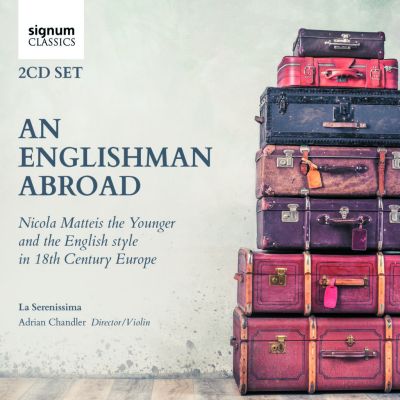
An Englishman Abroad (Album)
‘Celebrating the work of the Anglo-Italian violinist and composer Nicola Matteis and “the English style in 18th-century Europe”, this superb disc takes as its starting point Matteis’s exposure to, and admiration of, the work of Henry Purcell. It follows his subsequent journey to the court of Emperor Leopold I in Vienna, where the music in his years as a court composer arguably produced a ripple effect of “Englishness”. The sequences make efforts to support this contention: Purcell’s Chacony for strings and continuo is followed by Telemann’s Ouverture-suite in G major with its Air Angloise, before Matteis’s own Concerto for violin, strings and continuo in B-flat major.
La Serenissima’s playing is perfection, at once courtly and refined.’
**** Dan Cairns, Sunday Times, May 2023
‘The English man of the title is the London-born violinist and composer Nicola Matteis the Younger (circa 1677-1737). The booklet note by Adrian Chandler attempts to unravel, not without speculation, the complicated skein of connections that surrounds the composer’s life. A source of confusion is the fact that he shared his full name with his rather more famous father, an Italian composer and spectacularly gifted violinist who had relocated to London around 1670.
Matteis is best remembered for his work at the Habsburg court in Vienna, where he worked from 1700 and where he composed nearly 60 ballets for use in operas by other composers.
The movements offered here are from Antonio Caldara’s 1717 La Verità nell’Inganno, the music, nicely sprung in performance, sounding more chunky than charming. The Violin Concerto in B flat, premiered in Dresden in 1710, sounds now to be less concerto than suite, the English flavour coming from some Purcellian moments. The clashing harmonies and tightly wound lines of Purcell’s great Chacony in G minor open the album in style, and a thrusting chaconne by Giuseppe Antonio Brescianello closes it.
Brescianello also contributes a Suite in C that, unusually for an Italian, includes a hornpipe, then normally confined to these islands. A suite by Telemann and a concerto by Vivaldi complete this intriguing programme.‘